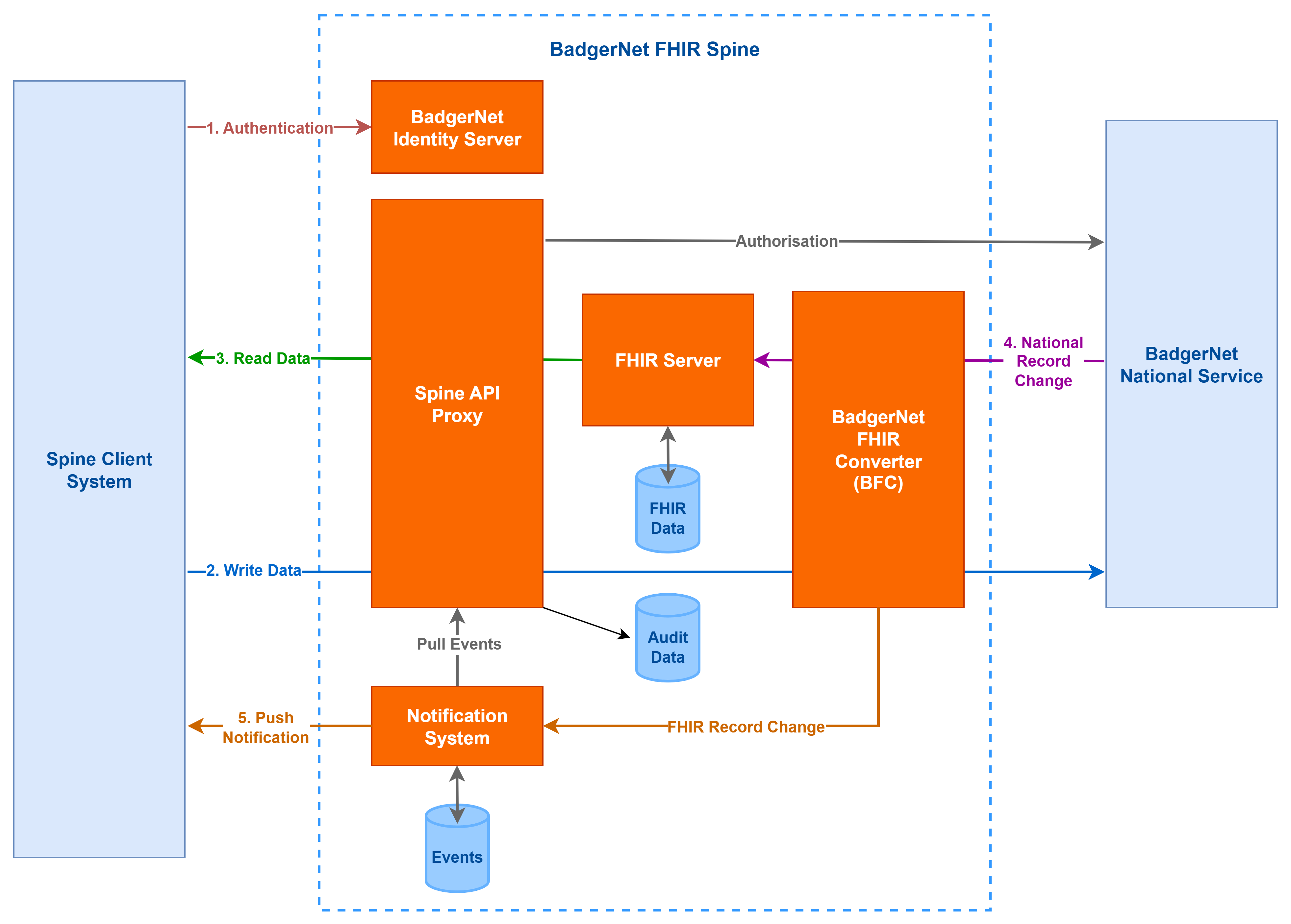BadgerNet Spine overview
What is the BadgerNet Spine?
The BadgerNet Spine is the interoperability platform for the nationally hosted BadgerNet Women and Children’s Health care record system implementations.
It allows non-BadgerNet Systems to write to and read from the national single pregnancy, newborn and neonatal care records that are held within the core BadgerNet platform.
The two key functions of the BadgerNet Spine platform are single patient record access and live multi-patient data export options.
Patient data flows
The BadgerNet Spine provides a live interoperability layer to the national raw BadgerNet care record platform for non-BadgerNet System Clients to access.
Key BadgerNet Platform data flow principles
The nationally-hosted master patient record is the raw BadgerNet care record, which is stored in a proprietary underlying structure that is not available to third parties.
BadgerNet Client Applications are used by BadgerNet care provider sites for live contemporaneous care record viewing and updates. These BadgerNet client systems include the Windows Desktop Application, Native iPad Application and Web-Browser Application (due 2023).
These BadgerNet Client Applications do not use FHIR for native care record updates. FHIR is used only for non-BadgerNet Spine Client Systems to write to and read from the BadgerNet care record.
Whenever a BadgerNet care record is updated in any way, a separate national FHIR-structured record is updated with a FHIR Version of the raw BadgerNet care record. This FHIR Version of the BadgerNet record is a subset of all the patient data items held in its respective raw BadgerNet care record. This update of the national FHIR record is usually completed within a few seconds of the underlying raw care record update. Spine Clients can “subscribe” to get push notification events for one or more care records so they can be made aware that any change has been made to their respective underlying FHIR record.
When a Spine Client writes a FHIR bundle of patient data items to the BadgerNet Spine API, then this bundle of data is processed synchronously, including the resulting save of data items to the raw BadgerNet care record.

Using BadgerNet Spine for single-patient care record access
Spine Client Systems can be any authorised and approved remote system that can access the BadgerNet Spine using HTTPS REST API to send and request patient data.
Patient data is sent to the Spine as FHIR-structured JSON strings, known as a “FHIR bundle”. When a client queries for single-patient data, then this is also returned to the Client as a FHIR-structured bundle formatted as a JSON string.
The BadgerNet Spine API only offers single-patent access to the Spine; the remote Client System must be able to identify a single patient record instance every time for both write and read operations.
Care record types available in the BadgerNet Spine include:
Single national pregnancy record for single pregnancy instance
Single baby birth record
Multi-episode neonatal care record
Other women’s and children's healthcare episode types may be made available in the future.
Which record types the Spine Client System can access is driven by the assigned Spine Client Type for each Spine Client System instance.
Which types of patient data and their associated FHIR Resource Types are defined by the Spine Record Filter type that is assigned to each Spine Client System instance.
Example usage scenarios
Example: Remote care records systems
The Spine provides a live API for authorised remote care record systems to read from and write to single patient records to allow synchronisation of specific data items between the two systems for the same patient care record.
Example: Remote regional or local patient data feed systems
This could include regional PAS or LAB Results solutions that have been tasked to send their specific data items to the national BadgerNet care record but don’t have a requirement to read from the Spine at all.
Example: Medical device data feeds
Provides a conduit for medical devices to send ad-hoc patient data samples directly to the national BadgerNet care record.
Example: Local or regional patient portal data links
Allows local care record data exchange platforms to query for BadgerNet care record data extracts for merging and displaying in real-time in a portal platform.
Using BadgerNet Spine for multi-patient live data extract
The BadgerNet Spine can provide options for bulk patient data extraction to on-premise data storage and isolated sandpits for separate audit and research projects.
Each extract would need to be configured by the BadgerNet Support Team to provide either nationally hosted or on-premise instances of a SQL Server Database, or stand-alone FHIR Server. A specific export data set is defined for each project as either SQL Tables or hosted in a separate FHIR Server, both of which are then updated in real-time and available for read-only access at any time by the customer.
Each configuration would be set up to ensure that the customer can only access patient records they have been authorised to extract.
Example uses
Example: Local care location reporting database
Provides an on-premise SQL Server instance for a single BadgerNet Care Location to have a real-time update, read-only patient database for reporting and analysis as needed.
Example: Regional reporting database
For single clinical networks or regions to have access to live SQL Server databases for reporting.
Example: National audit or research database
For national projects to have access to a live SQL Server DB for audit and research projects.
Example: National or regional FHIR Database
BadgerNet can host a separate “sandpit” FHIR Server that contains only the patient records the project is authorised to access and then provides a fully-featured, read-only multi-patient FHIR query server.
Note: All bulk data extract options provided by the BadgerNet Spine platform are created and managed as separate distinct projects that require specification, governance permissions and authorisations, and have associated charges. Please email support@clevermed.com if you require further information on the available options in this regard.
What the BadgerNet Spine is NOT
The BadgerNet Spine does NOT perform any of the following features:
A live, national, full multi-patient query FHIR Server. Clients cannot query the Spine across multiple care records with one query/transaction. A single record must be identified each time. If required for a regional/national audit or research project, the BadgerNet Spine can host a separate project-specific FHIR Server instance that is automatically populated with specific data elements from the care records that the project has the authorisation to have access to.
A system that human users access. The HTTP endpoint for the BadgerNet Spine is only for authenticated remote computer system use. Apart from administration tools, there is no interactive user interface for routine BadgerNet Spine usage.
A mechanism for change requests or care record structure and data set additions to the national BadgerNet Care Record. If a Spine Client sends FHIR-structured data that is not compatible with the published profiles and data sets on this site, these will be ignored and will not update the underlying national single record.
